- Home
- Ian Mcewan
Amsterdam Page 6
Amsterdam Read online
Page 6
To forestall him. Clive put out a hand for another picture. In this, a head-and-shoulders shot, Garmony’s dress was more silkily feminine. There was a simple line of lace around the high sleeves and neckline. Perhaps it was lingerie he was wearing. The effect was less successful, unmasking completely the lurking masculinity and revealing the pathos, the impossible hopes of his confounded identity. Molly’s artful lighting could not dissolve the jawbones of a huge head or the swell of an Adam’s apple. How he looked and how he felt he looked were probably very far apart. They should have been ridiculous, these photographs, they were ridiculous, but Clive was somewhat awed. We knew so little about each other. We lay mostly submerged, like ice floes, with our visible social selves projecting only cool and white. Here was a rare sight below the waves, of a man’s privacy and turmoil, of his dignity upended by the overpowering necessity of pure fantasy, pure thought, by the irreducible human element—mind.
For the first time Clive considered what it might be like to feel kindly toward Garmony. It was Molly who had made it possible. In the third of the pictures he wore a boxy Chanel jacket and his gaze was turned downward; on some mental screen of selfhood he was a demure and feasible woman, but to an outsider what showed was evasion. Face it, you’re a man. He was better off looking to camera, confronting us with his pretense.
“So?” Vernon was becoming impatient.
“Extraordinary.”
Clive handed the photographs back. He could not think clearly with the images still in his view. He said, “So you’re fighting to keep them out of the paper.”
It was part tease, part mischief, as well as a wish to delay voicing his thoughts.
Vernon was staring at him, amazed. “Are you mad? This is the enemy. I just told you, we’ve got the injunction lifted.”
“Of course. Sorry. I wasn’t quite with it.”
“My idea is to publish next week. What do you think?”
Clive tilted back on his chair and clasped his hands behind his head. “I think,” he said carefully, “your staff is right. It’s a really terrible idea.”
“Meaning?”
“It’ll ruin him.”
“Dead right it will.”
“I mean, personally.”
“Yup.”
There was a stalled silence. So many objections came crowding in on Clive that they seemed to cancel each other out.
Vernon pushed his empty glass across the table, and as it was filled he said, “I don’t get it. He’s pure poison. You’ve said so yourself many times.”
“He’s vile,” Clive agreed.
“The word is he’ll be mounting a leadership challenge in November. It would be terrible for the country if he was prime minister.”
“I think so too,” Clive said.
Vernon spread his hands. “So?”
There was another pause while Clive stared up at the cracks in the ceiling, shaping his thoughts. At last he said, “Tell me this. Do you think it’s wrong in principle for men to dress up in women’s clothes?”
Vernon groaned. He was beginning to behave like a drunk. He must have had a few before arriving. “Oh, Clive!”
Clive kept on. “You yourself were once an apologist for the sexual revolution. You stood up for gays.”
“I don’t believe I’m hearing this.”
“You stood up for plays and films that people wanted to ban. Only last year you spoke up for those cretins who were in court for hammering nails through their balls.”
Vernon winced. “Penis, actually.”
“Isn’t this the kind of sexual expression you’re so keen to defend? What exactly is Garmony’s crime that needs to be exposed?”
“His hypocrisy, Clive. This is the hanger and flogger, the family values man, the scourge of immigrants, asylum seekers, travelers, marginal people.”
“Irrelevant,” Clive said.
“Of course it’s relevant. Don’t talk crap.”
“If it’s okay to be a transvestite, then it’s okay for a racist to be one. What’s not okay is to be a racist.”
Vernon sighed in fake pity. “Listen to me—”
But Clive had found his trope. “If it’s okay to be a transvestite, then it’s okay for a family man to be one too. In private, of course. If it’s okay to—”
“Clive! Listen to me. You’re in your studio all day dreaming of symphonies. You’ve no idea what’s at stake. If Garmony’s not stopped now, if he gets to be prime minister in November, they’ve got a good chance of winning the election next year. Another five years. There’ll be even more people living below the poverty line, more people in prison, more homeless, more crime, more riots like last year. He’s been speaking in favor of national service. The environment will suffer, because he’d rather please his business friends than sign the accords on global warming. He wants to take us out of Europe. Economic catastrophe! It’s all very well for you”—here Vernon gestured around at the enormous kitchen—“but for most people …”
“Careful,” Clive growled. “When you’re drinking my wine.” He reached for the Richebourg and filled Vernon’s glass. “A hundred and five pounds a bottle.”
Vernon downed half the glass. “My point precisely. You’re not becoming comfortable and right-wing in your middle age, are you?”
Clive answered the taunt with one of his own. “You know what this is really about? You’re doing George’s work. He’s setting you on. You’re being used, Vernon, and I’m surprised you can’t see through it. He hates Garmony for his affair with Molly. If he had something on me or you, he’d use that too.” Then Clive added, “Perhaps he has. Did she take any of you? In the frogman’s suit? Or was it the tutu? The people must be told.”
Vernon stood up and put the envelope back in his case. “I came round hoping for your support. Or at the least, a sympathetic hearing. I didn’t expect your fucking abuse.”
He went out into the hall. Clive followed him, but he did not feel apologetic.
Vernon opened the door and turned. He looked unwashed, wrecked. “I don’t get it,” he said quietly. “I don’t think you’re being straight with me. What is it you really object to about this?”
Possibly the question was rhetorical. Clive took a couple of steps toward his friend and answered it. “Because of Molly. We don’t like Garmony, but she did. He trusted her, and she respected his trust. It was something private between them. These are her pictures, nothing to do with me or you or your readers. She would have hated what you’re doing. Frankly, you’re betraying her.”
Then, rather than let Vernon have the satisfaction of closing the door on him, Clive turned and walked away, toward the kitchen, to eat his supper alone.
iii
Outside the hotel, set against a rough stone wall, was a long wooden bench. In the morning, after breakfast, Clive sat here to lace his boots. Although he was missing the key element of his finale, he had two important advantages in his search. The first was general: he felt optimistic. He had done the background work in his studio, and though he hadn’t slept well, he was cheerful about being back in his favorite landscape. The second was specific: he knew exactly what he wanted. He was working backward really, sensing that the theme lay in fragments and hints in what he had already written. He would recognize the right thing as soon as it occurred to him. In the finished piece the melody would sound to the innocent ear as though it had been anticipated or developed elsewhere in the score. Finding the notes would be an act of inspired synthesis. It was as if he knew them but could not yet hear them. He knew their enticing sweetness and melancholy. He knew their simplicity, and the model, surely, was Beethoven’s Ode to Joy. Consider the first line—a few steps up, a few steps down. It could be a nursery tune. It was completely without pretension and yet carried such spiritual weight. Clive stood to receive his packed lunch from the waitress who had brought it out to him. Such was the exalted nature of his mission, and of his ambition. Beethoven. He knelt on the car-park gravel to stow in his daypack the grated c
heese sandwiches.
He slung the pack across his shoulder and set off along the track into the valley. During the night a warm front had moved across the Lakes, and already the frost had gone from the trees and from the meadow by the beck. The cloud cover was high and uniformly gray, the light was clear and flat, the path dry. Conditions did not come much better in late winter. He reckoned he had eight hours of daylight, though he knew that as long as he was off the fells and back down in the valley by dusk, he could find his way home with a torch. He had time then to climb Scafell Pike, but he could delay the decision until he was on Esk Hause.
During the first hour or so, after he had turned south into the Langstrath, he felt, despite his optimism, the unease of outdoor solitude wrap itself around him. He drifted helplessly into a daydream, an elaborate story about someone hiding behind a rock, waiting to kill him. Now and then he glanced over his shoulder. He knew this feeling well because he often hiked alone. There was always a reluctance to be overcome. It was an act of will, a tussle with instinct, to keep walking away from the nearest people, from shelter, warmth, and help. A sense of scale habituated to the daily perspectives of rooms and streets was suddenly affronted by a colossal emptiness. The mass of rock rising above the valley was one long frown set in stone. The hiss and thunder of the stream was the very language of threat. His shrinking spirit and all his basic inclinations told him that it was foolish and unnecessary to keep on, that he was making a mistake.
Clive kept on because the shrinking and apprehension were precisely the conditions—the sickness—from which he sought release, and proof that his daily grind—crouching over that piano for hours every day—had reduced him to a cringing state. He would be large again, and unafraid. There was no threat here, only elemental indifference. There were dangers, of course, but only the usual ones, and mild enough—injury from a fall, getting lost, a violent change of weather, night. Managing these would restore him to a sense of control. Soon human meaning would be bleached from the rocks, the landscape would assume its beauty and draw him in; the unimaginable age of the mountains and the fine mesh of living things that lay across them would remind him that he was part of this order and insignificant within it, and he would be set free.
Today, however, this beneficent process was taking longer than usual. He had been walking for an hour and a half and was still eyeing certain boulders ahead for what they might conceal, still regarding the somber face of rock and grass at the end of the valley with vague dread, and still pestered by fragments of his conversation with Vernon. The open spaces that were meant to belittle his cares were belittling everything; endeavor seemed pointless. Symphonies especially: feeble blasts, bombast, doomed attempts to build a mountain in sound. Passionate striving. And for what? Money. Respect. Immortality. A way of denying the randomness that spawned us and of holding off the fear of death. He stopped to tighten his bootlaces. Farther on he took off his sweater and drank deeply from his water bottle, trying to eradicate the taste of the kipper he had unwisely eaten at breakfast. Then he found himself yawning and thinking of the bed in his small room. But he could not possibly be tired already, nor could he turn back, not after all the efforts he had made to be here.
He came to a bridge across the stream and stopped to sit down. A decision had to be made. He could cross here and make a quiet ascent up the left side of the valley to Stake Pass, or he could continue to the very end of the valley, then scramble up three hundred feet or so of steep slope to Tongue Head. He didn’t really feel like a hand-over-hand scramble, but neither did he like the possibility that he might be giving in to weakness, or to age. Finally he decided to stay by the stream—the exertion of a climb might help jolt him out of his torpor.
An hour later he was at the end of the valley, facing the first steep incline and regretting his decision. It was beginning to rain hard, and whatever the claims made for the expensive waterproofs he was struggling into, he knew the physical effort of the climb was going to make him hot. Avoiding the slippery wet rock lower down, he picked a route over high, turfed banks, and sure enough, within minutes the sweat was pouring into his eyes along with the rain. It bothered him that his pulse was so rapid so soon and that he was pausing for breath every three or four minutes. An ascent like this should have been well within his powers. He drank from the water bottle and pushed on, taking advantage of his solitude to grunt and moan loudly at each difficult step.
With someone else along he might have made a joke of the humiliations of growing older. But these days he had no close friends in England who shared his compulsion. Everyone he knew seemed perfectly happy to get by without wilderness; a country restaurant, Hyde Park in spring, was all the open space they ever needed. Surely they could not claim to be fully alive. Hot, wet, panting, he strained to heave and lever himself onto a grassy ledge and lay there, cooling his face on the turf while the rain beat upon his back, and cursed his friends for their dullness, their lack of appetite for life. They had let him down. No one knew where he was, and no one cared.
After five minutes of listening to the rain rattling on the fabric of his waterproofs, he got to his feet and climbed on up. Anyway, was the Lake District really a wilderness? So eroded by walkers, with every last insignificant feature labeled and smugly celebrated. It was really nothing more than a gigantic brown gymnasium, and this incline just a set of grassy wall bars. This was a workout, in the rain.
More debilitating thoughts pursued him as he climbed toward the col, but as he gained height and the going became less steep, as the rain ceased and a long fissure in the cloud permitted a tiny consolation of diluted sunlight, it began to happen at last—he began to feel good. Perhaps it was no more than the effect of endorphins released by muscular exertion, or because he had simply found a rhythm. Or it might have been because this was a cherished moment in mountain walking, when one reached a col and began to cross the watershed and new summits and valleys inched into view—Great End, Esk Pike, Bowfell. Now the mountains were beautiful.
On near level ground now, he strode across the tussocky grass toward the track that brought walkers up from Langdale. In summer this was a depressingly busy route, but today there was just a solitary hiker in blue crossing the broad fell, hurrying purposefully toward Esk Hause as though to a rendezvous. As he approached he saw that it was a woman, which prompted Clive to cast himself in the role of her man, in the assignation she seemed so keen to reach: waiting for her by a lonely tarn, calling her name as she approached, taking from his pack the champagne and two silver flutes, and going toward her … Clive had never had a lover, or even a wife, who liked hiking. Susie Marcellan, always game for something new, went to the Catskills with him once and turned out to be a helpless Manhattan exile, complaining comically all day long about bugs, blisters, and the lack of cabs.
By the time he had reached the track, the woman was half a mile ahead of him and beginning to drift off to her right, toward Allen Crags. He stopped to let her go in order to have the great upland field to himself. The crack in the sky was opening further, and behind him, on Rosthwaite Fell, a baton of light across the bracken redeemed the reputation of the color brown with fiery reds and yellows. He packed the waterproofs away, ate an apple, and considered his route. He was for climbing Scafell Pike now; in fact, he was impatient to set off. The quickest way up was from Esk Hause, but now that he had loosened up, he had it in mind to continue northwest, drop down to Sprinkling Tarn and down again by Sty Head, and make the long ascent by the Corridor Route. If he came down under Great End and went home the way he had come up, by the Langstrath, he would be at the hotel by dusk.
So he set off at an easy stride toward the broad enticing crest of Esk Hause, feeling that there was not really so much physical difference between him and his thirty-year-old self after all, and that it was not sinew but spirit that had held him back. How strong his legs felt now that his mood had improved!
Skirting the broad scars of erosion caused by hikers, he made a curving route to the
ridge ahead of him and, as so often happened, thought about his life in fresh terms, gladdening himself with recollections of recent small successes: a reissue on disk of an early orchestral piece, a near-reverential mention of his work in a Sunday paper, the wise and humorous speech he had given when awarding the composition prize to a dumbstruck schoolboy. Clive thought of his work in totality, of how varied and rich it seemed whenever he was able to raise his head and take the long perspective, how it represented in abstract a whole history of his lifetime. And still so much to do. He thought affectionately about the people in his life. Perhaps he had been too hard on Vernon, who was only trying to save his newspaper and protect the country from Garmony’s harsh policies. He would phone Vernon this evening. Their friendship was too important to be lost to one isolated dispute. They could surely agree to differ and continue to be friends.
These benign thoughts brought him at last to the ridge where he had a view of the long descent toward Sty Head, and what he saw made him cry out in irritation. Spread out over more than a mile, marked by brilliant points of fluorescent oranges, blues, and greens, was a party of walkers. They were schoolchildren, perhaps a hundred of them, filing down to the tarn. It would take him at least an hour to overtake them all. Instantly the landscape was transformed, tamed, reduced to a trampled beauty spot. Without giving himself time to dwell on old themes of his—the idiocy and visual pollution of Day-Glo anoraks, or why people were compelled to go about in such brutally large groups—he turned away to his right, toward Allen Crags, and the moment the party was out of sight he was restored to his good mood. He would spare himself the energetic ascent of Scafell Pike and instead make a leisurely return along the ridge and down Thornythwaite Fell into the valley.

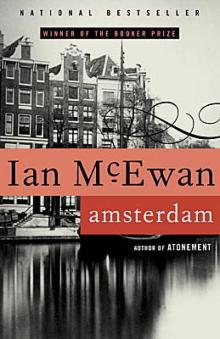 Amsterdam
Amsterdam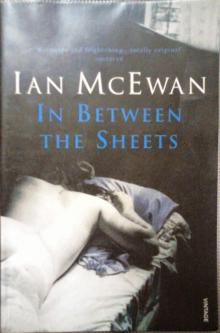 In Between the Sheets
In Between the Sheets Atonement
Atonement My Purple Scented Novel
My Purple Scented Novel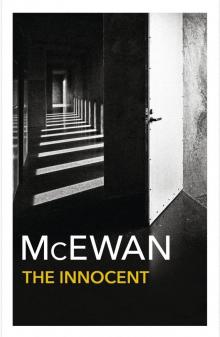 The Innocent
The Innocent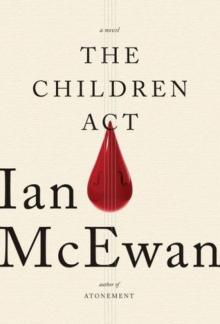 The Children Act
The Children Act Enduring Love
Enduring Love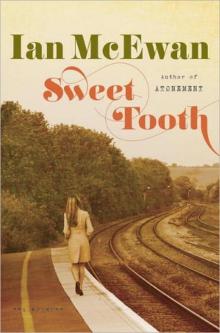 Sweet Tooth
Sweet Tooth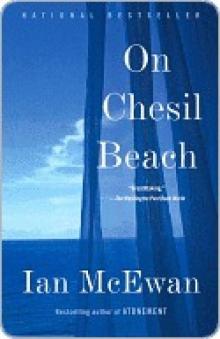 On Chesil Beach
On Chesil Beach The Child in Time
The Child in Time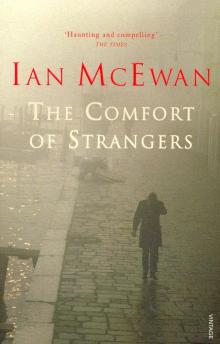 The Comfort of Strangers
The Comfort of Strangers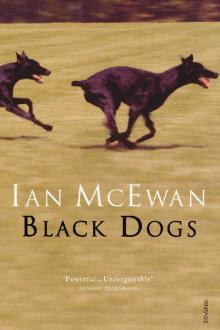 Black Dogs
Black Dogs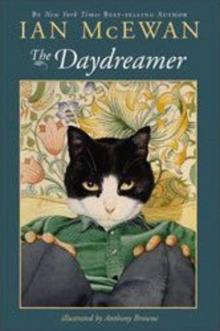 The Daydreamer
The Daydreamer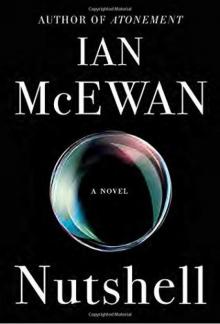 Nutshell
Nutshell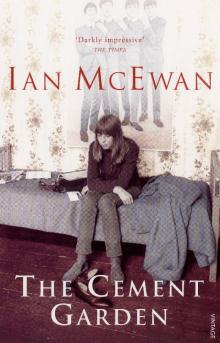 The Cement Garden
The Cement Garden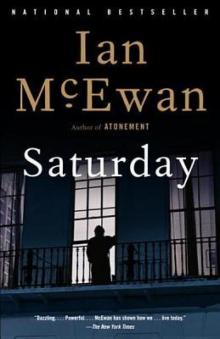 Saturday
Saturday Machines Like Me
Machines Like Me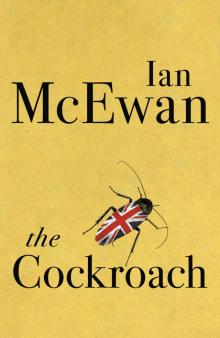 The Cockroach
The Cockroach The Ploughman’s Lunch
The Ploughman’s Lunch